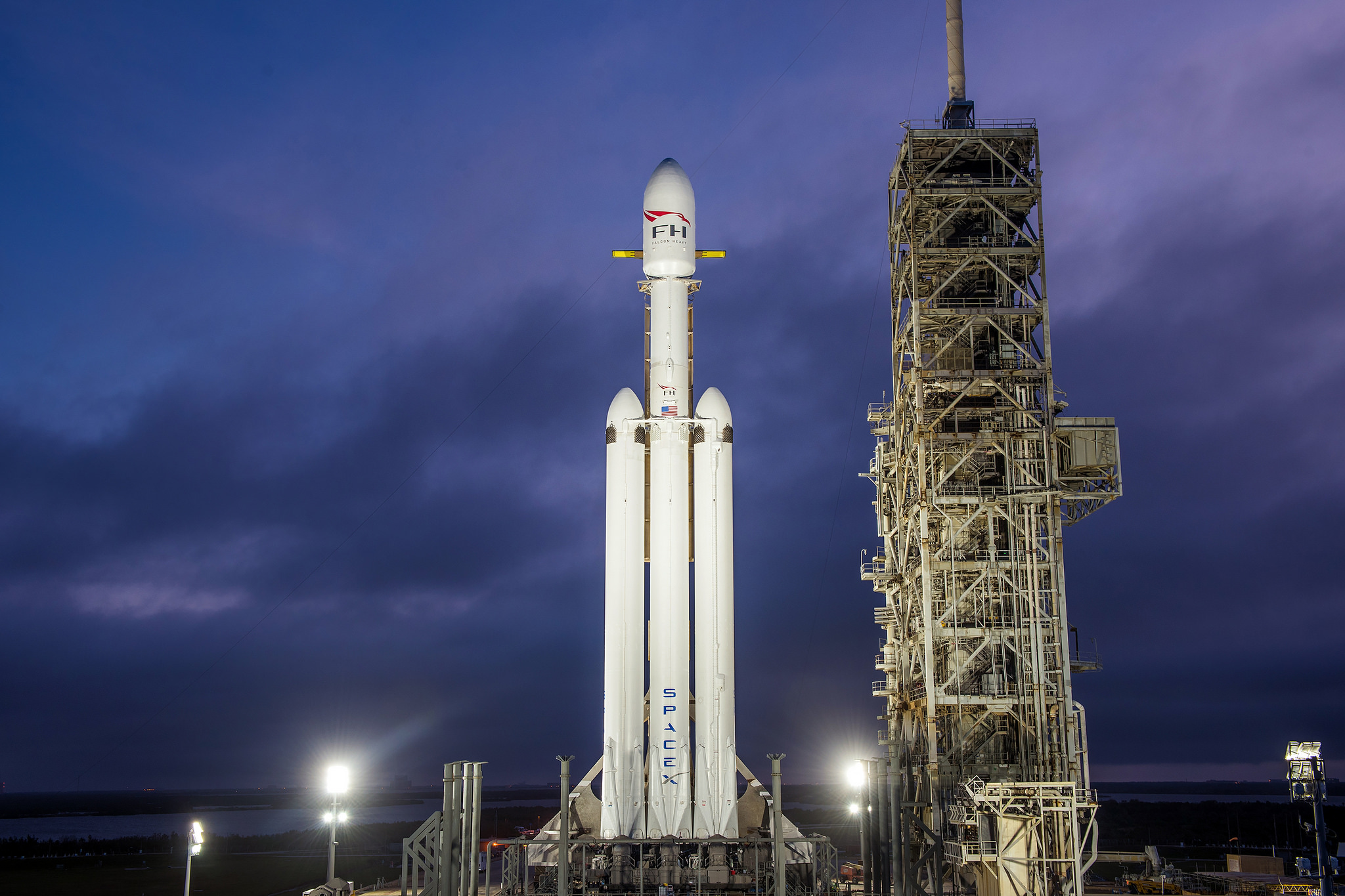SpaceX's First Falcon Heavy Rocket Test Launch Set for Feb. 6
SpaceX will attempt the first launch of its new giant rocket, the Falcon Heavy, on Feb. 6, the company's CEO Elon Musk said Saturday (Jan. 27).
The much-anticipated maiden flight of SpaceX's Falcon Heavy rocket will lift off from the historic Launch Pad 39A — the same one used for NASA's Apollo moon missions and space shuttle flights — at the agency's Kennedy Space Center in Cape Canaveral, Florida. Musk's announcement came three days after SpaceX test-fired the Falcon Heavy's 27 first-stage engines for the first time at the launchpad on Wednesday (Jan. 24).
"Aiming for first flight of Falcon Heavy on Feb. 6 from Apollo launchpad 39A at Cape Kennedy," Musk wrote on Twitter. "Easy viewing from the public causeway." [In Photos: SpaceX's 1st Falcon Heavy Rocket at the Pad]
While Musk did not specify a launch time for the Falcon Heavy's first flight, the mission may lift off during a three-hour launch window that opens at 1:30 p.m. EST (1830 GMT), according to a SpaceNews report. A backup launch date is available the following day, SpaceNews added.

SpaceX's Falcon Heavy booster is the most powerful rocket since NASA's Saturn V moon rocket. Its first stage consists of three Falcon 9 cores that are designed to return to Earth after launch much like the company's solo Falcon 9 flights.
The heavy-lift rocket stands 230 feet tall (70 meters) and is designed to launch payloads of up to 119,000 lbs. (57 metric tons) into space. It can carry twice the load of its nearest rival: the Delta IV Heavy built by the United Launch Alliance.
For its debut flight, the Falcon Heavy is carrying Elon Musk's Tesla Roadster into space. Musk has said the launch, if successful, will deliver the Roadster into a heliocentric orbit that will eventually send the midnight-cherry-red electric car by Mars.
Get the Space.com Newsletter
Breaking space news, the latest updates on rocket launches, skywatching events and more!
However, Musk has repeatedly attempted to lower expectations for the Falcon Heavy's first flight, saying there is a fair chance the launch could fail.
"There's a lot that could go wrong there," Musk said last year. "I encourage people to come down to the Cape to see the first Falcon Heavy mission; it's guaranteed to be exciting."
And Musk isn't alone in promising excitement. The Kennedy Space Center Visitor Complex (KSCVC), which offers tickets to view launches from Florida's Space Coast, unveiled a series of Falcon Heavy launch viewing packages on Thursday (Jan. 25).
Those launch viewing packages range in price from $35 per person (for simple viewing access and parking) to the already-sold-out $195 per person "Feel the Heat" package, which offers two-day admission to the KSC Visitor Complex, transportation to a viewing area at the complex's Apollo/Saturn V Center, a trip to the Shuttle Landing Facility, a catered meal, SpaceX hat and other amenities.
"When SpaceX’s Falcon Heavy lifts off from Kennedy Space Center's famed Pad 39A, the same launchpad from which Buzz Aldrin and Neil Armstrong set course for the moon on Apollo 11 in 1969, a new kind of history will be made," KSCVC representatives said in the announcement.
SpaceX's Falcon Heavy test flight will come one week after the company's next mission. That flight will launch a Falcon 9 rocket carrying the GovSat-1 communications satellite from Space Launch Complex-40 at Cape Canaveral Air Force Station.
Email Tariq Malik at tmalik@space.com or follow him @tariqjmalik and Google+. Follow us @Spacedotcom, Facebook and Google+. Original article on Space.com.
Join our Space Forums to keep talking space on the latest missions, night sky and more! And if you have a news tip, correction or comment, let us know at: community@space.com.

Tariq is the Editor-in-Chief of Space.com and joined the team in 2001, first as an intern and staff writer, and later as an editor. He covers human spaceflight, exploration and space science, as well as skywatching and entertainment. He became Space.com's Managing Editor in 2009 and Editor-in-Chief in 2019. Before joining Space.com, Tariq was a staff reporter for The Los Angeles Times covering education and city beats in La Habra, Fullerton and Huntington Beach. In October 2022, Tariq received the Harry Kolcum Award for excellence in space reporting from the National Space Club Florida Committee. He is also an Eagle Scout (yes, he has the Space Exploration merit badge) and went to Space Camp four times as a kid and a fifth time as an adult. He has journalism degrees from the University of Southern California and New York University. You can find Tariq at Space.com and as the co-host to the This Week In Space podcast with space historian Rod Pyle on the TWiT network. To see his latest project, you can follow Tariq on Twitter @tariqjmalik.









